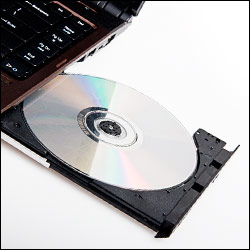Sign up to receive The Snapshot, a free special dispatch from Laptop Mag, in your inbox.
You are now subscribed
Your newsletter sign-up was successful
One of the most interesting parts of the recent Apple Mac Mini and MacBook Air refresh is that Apple is moving away from optical drives. Apple isn't the only company to do so, raising the question "Is the optical drive going the way of the floppy disk?"
CD and DVD optical drives have enjoyed a long and integral history with the personal computer, but increased connectivity and flash memory technology have made it less essential in recent years. The new Mac Mini eschews the optical drive and the MacBook Air — which never had an optical drive —completely replaced the standard MacBook that did have an optical drive (although the MacBook Pro still retains its optical drive).
And Apple isn't alone in making devices that don't need discs. Netbooks, the smaller and cheaper versions of laptops, have never had optical drives, either. Instead they rely on downloading the software they need directly from the manufacturer. The next generation of devices — smartphones and tablets —were designed from the ground up to never need physical media at all.
There are increasing incentives to remove optical drives, too. Sergis Mushell, an analyst with the Gartner research firm, explained to TechNewsDaily that increased demand for thinner devices forces manufacturers to remove optical drives.
"There is a move toward no optical drives, primarily driven by form factor, because thinner is the goal. Thinner is better these days," Mushell said.
Efforts to increase battery performance also obviate the use of optical drives.
"Optical drives require motors to spin the disc, and this uses more battery," Mushell said. "Companies are taking out motorized drives to improve battery life."
Sign up to receive The Snapshot, a free special dispatch from Laptop Mag, in your inbox.
App stores are contributing to the obsolescence of optical drives. Increasingly, consumers are downloading software instead of buying a disc in a box. Even though the app store trend started with phones, many software publishers are creating their own online portals for selling computer software, no disc required.
Apple has started the Mac App Store, offering most of the major Mac programs for download, including the Mac OS X operating system itself, meaning that even desktop owners may never need another disc. And the PC gaming industry, which has relied heavily on CD and DVD sales for decades, has turned to online shops such as Steam, GOG.com and Origin to offer downloads directly to buyers.
So it seems that optical drives are on a fast path to oblivion, right?
Not yet.
Mushell said that optical drives still have life in them, though they will never be present in thinner devices. He pointed out that many professional-grade programs still come on discs and professional users will continue to use optical drives for years to come.
Thinness won't be an issue for some devices, Mushell added. Desktops obviously have plenty of room for optical drives, and even the MacBook Pro, Apple's high-end laptop, won't ever get much thinner because of the constraints of other technology inside — for instance, the cutting-edge processors will still need heat sinks that restrict how thin the device can get.
Even the move toward downloadable content isn't an instant replacement for discs in some areas.
"It depends on geography," Mushell said. "Many people are still attached to their physical media, and many people don't have fast enough broadband connectivity, making it difficult to rely on downloads."
In many parts of the world, including rural and suburban areas of Europe and North America, many people still don't have much better than dial-up Internet speeds. Until broadband reaches them, physical discs and optical drives will still be an important factor for computer owners.
Mushell emphasizes that optical drives aren't dead, yet. And even as people migrate towards digital downloads, he said that external optical drives, which can be plugged into devices and used with multiple machines, will become an important tool.
Just don't expect Apple to start selling them.

